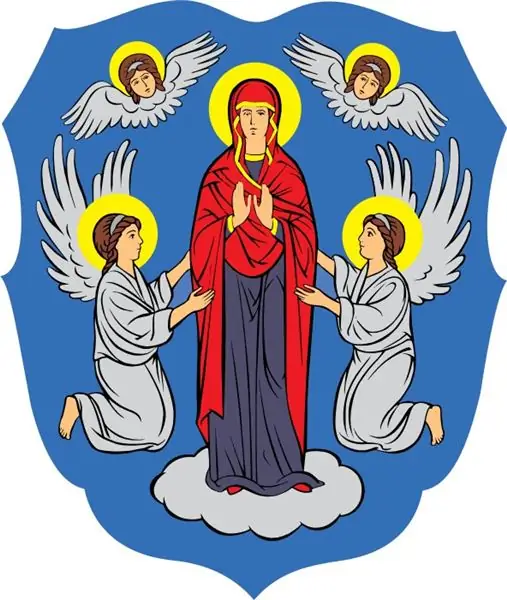
Few of the world's capitals can be proud of the fact that their main symbol has a long history. The coat of arms of Minsk was awarded in 1591, this happened two years after the city was awarded the Magdeburg Law.
The Mother of God - the central image of the coat of arms
The Ascension of the Mother of God is presented on the main official symbol of the Belarusian capital. In the center is depicted the Virgin Mary, who is being lifted by flying angels, two cherubim are waiting for her in the sky.
The original document on the appropriation of the coat of arms has not survived, but it is known that it was signed by Sigismund III, King of Poland and Grand Duke of Lithuania. A copy has been preserved in the Lithuanian Metric, from which it becomes clear which symbols are present on the coat of arms of Minsk.
The National Historical Archive of Belarus contains documents related to the activities of the Minsk magistrate. On various official papers one can see seals with the image of the coat of arms of Minsk. Fortunately for the Belarusians, the seals themselves have survived with the coat of arms; they can be dated to the 16th - 17th centuries. If you carefully examine the photos of these seals, you will notice that the images are different from each other. So, on one of the stamps, instead of angels and cherubs, there is the Holy Trinity, another stamp depicts the Mother of God not standing, but sitting on a cloud.
After these lands, including Minsk, became part of the Russian Empire, the city's coat of arms changed. An exact description of it can be found in the decree of Empress Catherine II, issued in January 1796. Rather, the coat of arms itself remained unchanged, but it was depicted on the chest of a two-headed eagle, the official symbol of the empire.
Legendary icon
Minsk received such a coat of arms not by chance, for there is a legend that an icon came to Minsk from the glorious city of Kiev, destroyed by the Tatar hordes, upstream of the Svisloch. It depicted "The Ascension of the Virgin". The townspeople decided that a church should be built in the place where the icon had stopped. Soon the first temple in Minsk appeared, however, today it cannot be found on the city map, although the remains of the foundation remain.
In 2015, a symbolic sign was installed at this place, which has an image of the coat of arms and several vertical glass structures. They symbolize the Svisloch River, through which the icon arrived in the city.
Interesting Facts
On the seal, which was used by the leaders of the Minsk Noble Deputy Assembly, the main "heroine", the Virgin Mary, is depicted not in a traditional outfit, but in a dress with a crinoline fashionable at that time.
From 1917 until the return of independence to Belarus, the coat of arms of Minsk was not used. Since 1991, it can be seen again on the official documents of the Belarusian capital.






